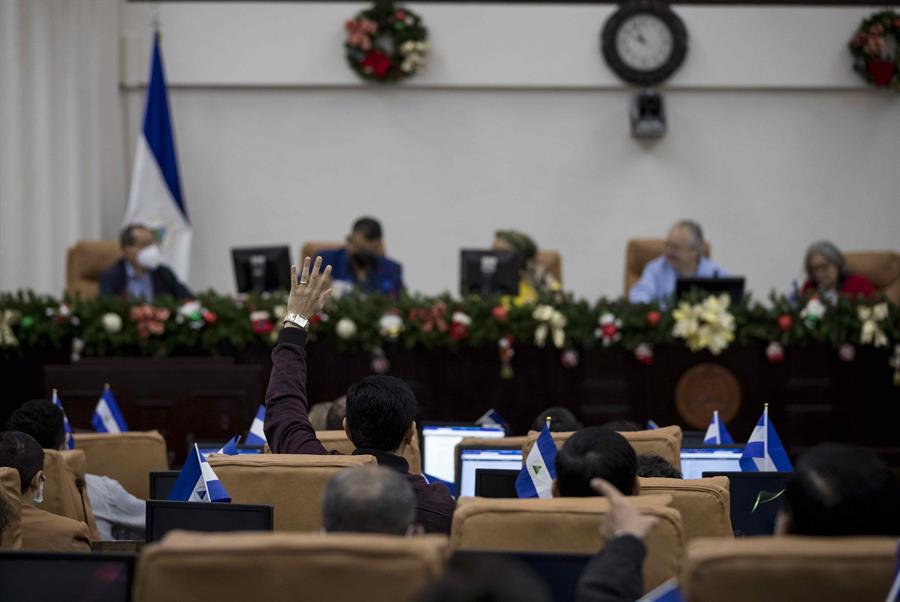
Spanish – Daniel Ortega’s regime dealt another blow to freedom in Nicaragua, seeking to armor itself on all sides before next year’s presidential elections, where he hopes to be reelected for the fourth consecutive time.
As planned, the Sandinista majority parliament approved, as a matter of “urgency” the law that will prevent candidates from being “traitors to the country.” The qualifiers included in this new regulation seem to serve as an excuse for Ortega to exclude anyone who is not in his favor.
According to the approved text, these “traitors” will not be eligible for public office if they lead or finance a coup d’état, if they alter the constitutional order, encourage or urge terrorist acts, and/or carry out actions that “undermine independence, sovereignty, and self-determination.”
The “Law in Defense of the Rights of the People to Independence, Sovereignty, and Self-Determination for Peace” was approved with 70 votes from the Sandinistas and their allies, against 14 votes against and five abstentions.
Ortega’s dictatorial measures
“Anyone who commits treason against the country will be punished according to the present law,” said the Sandinista president of Parliament, Gustavo Porras.
The coercive law was proposed by Daniel Ortega himself only three days before. The parliament approved it almost immediately. The urgency to consolidate power is evident.
It is not surprising that the Nicaraguan ruler takes such dictatorial measures. He made this clear in his first term (1985-1990) when he based his government on Marxist and socialist ideas in conjunction with the late Fidel Castro.
During that period, he led the country into a deep economic and social crisis that ended with presidential elections. The victory went to the opposition candidate, Violeta Barrios, supported by right-wing and even center-left parties.
It would then be valid to ask if Ortega wants to avoid a similar episode, which took away the presidency from him because of his own Marxist ideals.
“They would have to apply such a law to Daniel Ortega for all the human rights violations he has committed,” said Juan Sebastian Chamorro, director of the opposition organization Alianza Cívica.
New sanctions
This new law was approved just as the United States announced sanctions against three government officials: Marvin Aguilar, vice president of the Supreme Court of Justice, Wálmaro Gutiérrez, Sandinista deputy, and Fidel Domínguez, chief of police.
The US Treasury Department accuses them of “supporting the systematic identification, intimidation, and punishment of opponents carried out by the Ortega regime,” reported DW. The sanction implies the blocking of any of its assets in the US financial system.
A report published in 2019 by the United Nations High Commissioner for Human Rights (UNHCHR) exposed the abuses of the Sandinista authorities.
It details how the Ortega regime has committed human rights violations such as torture, arbitrary detentions, sexual violence, and kidnappings, among others. The same line as his Venezuelan friend, Nicolás Maduro.
Human Rights Watch’s Director for the Americas, José Miguel Vivanco, warned that the new law openly violates the human right to political participation and will help consolidate the Ortega-Murillo dictatorship.
Thirteen years of power and control
“All that’s left to do is putting (in the law) an article 2 saying that only Ortega and his wife (Murillo) can be candidates,” ironized former Sandinista guerrilla Dora María Téllez, reported by EFE.
Téllez served as health minister during Ortega’s first term, but she distanced herself and is now critical of her former boss’ actions.
It has been 13 years since Daniel Ortega took office, and along with his wife, Vice President Rosa Murillo, they have implemented a regime of censorship and persecution in the country that seeks to silence all dissident voices. This law hits a new low, thus consolidating the hostile environment in which the country is immersed.
The vice-president is also sanctioned. The US Treasury Department reported in 2018 that Murillo influences the youth organization of the Sandinista Liberation Front, which has allegedly committed extrajudicial killings, torture, and kidnappings.
Both of them, with the help of the influenced institutions, continue to increase their power without any possibility of changing the scenario.
 Versión Español
Versión Español













